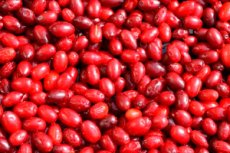Medical expert of the article
New publications
Cotoneaster in type 1 and type 2 diabetes mellitus
Last reviewed: 04.07.2025

All iLive content is medically reviewed or fact checked to ensure as much factual accuracy as possible.
We have strict sourcing guidelines and only link to reputable media sites, academic research institutions and, whenever possible, medically peer reviewed studies. Note that the numbers in parentheses ([1], [2], etc.) are clickable links to these studies.
If you feel that any of our content is inaccurate, out-of-date, or otherwise questionable, please select it and press Ctrl + Enter.

Berries are an important source of nutrients for diabetics, so it is very important that various healthy fruits periodically appear on the table of patients. One of these fruits is dogwood. This oblong red berry (some varieties have yellow fruits) can be seen on the branches of a perennial shrub (lives up to 250 years).
Benefits
The attractive appearance and the sour-sweet, slightly tart taste of the berries make them popular in the food industry. But this plant also has pronounced healing properties, and all parts of the plant are valuable.
Cornelian cherry is a fruit with a high content of ascorbic acid. The berries of the plant are also rich in beta-carotene and vitamin PP, and the leaves contain fairly high concentrations of vitamin E. The mineral composition of cornelian cherry is varied and similar to other berries, but the presence of sulfur, which stimulates carbohydrate metabolism and insulin synthesis, makes the berry very useful for diabetes.
In addition to correcting blood glucose levels, dogwood can reduce high blood pressure, remove toxic substances and waste from the body, fight inflammatory processes, improve the digestive system (and most importantly, the pancreas) and intestinal motility. Tasty and healthy berries increase the permeability of cell membranes, improve metabolism and blood composition (increase hemoglobin), strengthen vascular walls, and have a positive effect on the liver and urinary system. The general strengthening and tonic effect of the plant, which gives energy and activates the body's defenses, will be useful not only for diabetics, but also for generally healthy people.
The glycemic index of dogwood is low - only 25 units. For patients with type 2 diabetes, not only the GI of the product plays a big role, but also its caloric content, which is low for dogwood berries (44 kcal). The carbohydrate content in 100 g of fruit is 10 and a half grams.
As we can see, dogwood berries are quite acceptable for consumption with diabetes of any type. They can be eaten fresh, 1 glass per day, dividing this dose into 3 doses, or compotes and infusions can be prepared based on them. To prepare compote, take 1 glass of berries per 1.5 liters of water and boil the mixture for 3-5 minutes. The infusion is prepared from dried fruits, while for 2 glasses of water you will need to take 20 g of dry raw materials and insist for several minutes. Such drinks are recommended to be consumed between meals in the amount of 1 glass.
Regular intake of fresh dogwood juice is also useful for diabetes. It should be consumed ¼ cup half an hour before meals, gradually increasing the single dose to 1 cup, if this does not cause unpleasant symptoms.
Contraindications
The fruits of this plant have a pronounced sweet and sour taste and contain a lot of vitamin C, which can negatively affect the condition of patients with increased acidity of gastric juice. It is not advisable to get carried away with the consumption of berries for those who have gastritis or stomach ulcers, especially in the acute stage.
Eating berries may be associated with intolerance reactions or allergic reactions. People with symptoms such as skin rash, runny nose, dizziness, nausea, etc. should avoid this delicacy.
Dogwood berries can lower blood pressure, which is unlikely to be of benefit to patients with hypotension, but will come in handy for hypertensive patients.
The tonic effect of dogwood and its ability to influence uterine contractility can be dangerous for pregnant women.
 [ 6 ]
[ 6 ]

